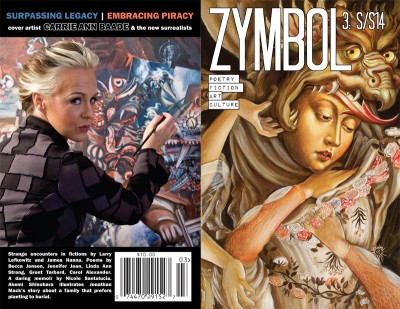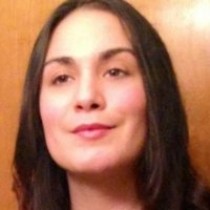KGB Interview - Anne James
 It is always inspiring to meet writers who are as interested in helping others craft, publish and promote their prose or poetry as they are their own. Anne James is such an individual, sharing her responsibility as the chief editor of an up-coming-literary journal with the rigors of writing. KGB slowed this literary dynamo down for a moment with a few questions about how she handles this balancing act and more.
It is always inspiring to meet writers who are as interested in helping others craft, publish and promote their prose or poetry as they are their own. Anne James is such an individual, sharing her responsibility as the chief editor of an up-coming-literary journal with the rigors of writing. KGB slowed this literary dynamo down for a moment with a few questions about how she handles this balancing act and more.
Q: You are the chief editor of Zymbol, a print magazine that is gaining momentum and creating a buzz in the literary community for its content, which while eclectic and nonconforming, shares a connection with Symbolism or Surrealism. You are quoted in NewPages as saying that “there is a vacancy in the world of art and literature for a publication that is both surreal and grounded in experience.” How is Zymbol filling this void, and why do you think it is important?
There are a lot of publications that are too generalized, and that is why very few literary journals have large subscriber bases: because they are trying to please a huge array of appetites, instead of cultivating an intensely loyal following in a genre for which the editorial team has a sincere passion. Having a clearly defined vision, and communicating it effectively to others who share this vision, are the key to longevity in any industry. Our tightly curated aesthetic vision pays homage to the symbolists and surrealists, but blazes a new trail into challenging and experimental contemporary literature. We stand out because no one else is doing this, and that's why we're becoming so successful.
As for what I specifically meant with that statement to NewPages: there are a couple of different meanings...
Firstly, I personally like to ease into a surreal story, like slowly stepping into the bath: I want to be lulled. If you try to drop me all at once into a bizarre landscape you won't make me believe it the way you would if you gave me a few hints of the surreal and enticed me further in. This is the formula for some of the most enduring surreal stories: they begin in mundane situations and lure us into their magical worlds. My favorite surreal stories are ones in which I never leave my own world - the surreal just sprinkles itself into it. The most wonderful people are the ones who see the surreal in everyday life and celebrate it.
The second meaning of that quote is, it's important to me that Zymbol promote not only great, enjoyable art and literature, but also social responsibility. My fiancé, Alex, who also edits Zymbol, has worked with charities in the UK and is extremely passionate about creating a positive impact in communities, and he planted the idea in my mind that Zymbol should take a stand and advocate on certain issues that affect us in the arts and humanities. Because as a nation we're tightening our belts and learning to live in this new, more sober economic climate, I see people's kids opting for careers in technology or business, when perhaps, if they weren't terrified of unemployment or being scoffed at, they might have gone for the humanities.
All of the sniggering in the media about the humanities is an epidemic -- even President Obama made an unfortunate joke about art history majors in the jobs market -- it's not a healthy attitude to take, because in the future, we'll be facing a deficit of cultural value. The jobs market reflects public opinion about the usefulness of the arts and humanities, so there needs to be a concerted effort to change that opinion and convince employers that these majors can add a huge amount of value to their organizations. I also want to use Zymbol as a platform to bring issues affecting the creative professions to the forefront, including proper compensation for labor, access to education, primary sources, grant opportunities, community outreach, and sustainable workspace creation, to name a few. As artist Carrie Ann Baade put it in our current issue, "This generation needs to renew its understanding of the significant role artists play in a healthy world." Alright, I'll get down from my soapbox. Next question.
Q: In addition to you work at Zymbol, you are the Treasurer of the New England Poetry Club and Associate Editor of St. Petersburg Review. As a writer yourself, how do these duties and the people and work they bring you in contact with inform your creativity in a positive way? Or is it challenge, so to speak, to wear so many literary hats?
It is absolutely a challenge to find the time to juggle all these responsibilities, and I am a classic workaholic -- so much so that sometimes Alex has to grab me and say, "Enough, take a break before you end up in the hospital." But all of these organizations have enormous value to me, and I enjoy being part of them. New England Poetry Club is the oldest and most prestigious professional poets association in the country and was founded by Amy Lowell, Robert Frost and Conrad Aiken. St. Petersburg Review publishes a whopping 50% international literature, much of it in translation and from underrepresented, war-torn countries.
Being an editor has tremendously improved my own writing, and I recommend taking a stint at it to anyone who is pursuing a career as a writer, even if you don't want to be an editor. Here's why: When you're an editor, someone sends you a manuscript and you're expected to take the wheel for them, tell them what is done well, and what needs improvement -- you have to get into the mindset of their voice, imagine you're the writer and make decisions. Inevitably you're going to be in this position with pieces that are completely foreign to your way of writing and choice of subject matter. You have to be able to get comfortable working with voices and ideas you'd never come up with on your own. And then, in your own writing, you start to take challenges, and push yourself beyond what you've done before, because you just edited a story about sexy aliens, and maybe you sort of liked how it felt! I'm writing in voices and genres that I never had any previous interest in until I read a story that made me think, "Actually, that's fucking cool, let me try something like that."
Q: What are you working on now, as a writer, and an editor?
I've been working on a screenplay for a couple of years now, about a literary family and the dark twisted relationships that spring up between the highly competitive siblings...I'm enjoying it so much that I keep putting off finishing. I also scrawl short poems from time to time and I try to edit them down to the point where they're saying as much as they can with the least amount of extraneous frill -- my grandfather, who was also a writer, prized this skill, he called it the Eric Sevareid touch. As an editor, I want to bring some more staffers into the fold at Zymbol. We've gotten an overwhelmingly positive response to the first three issues and the thing is growing at a rate that is making us reel -- so we really need more people to help manage it all. We just got a distribution deal to Books-A-Million stores nationwide, and next up, we're going to sign with distributors in the UK and Europe, because we've been handling those markets in-house and it's too much for us. It's the best kind of busy!

Anne James holds degrees from the University of Edinburgh and Boston University. She is the chief editor of Zymbol, a twice-yearly magazine of art, culture, and writing. She is an editor of St. Petersburg Review, an independent, international review of contemporary literature in translation. She also serves as Treasurer of New England Poetry Club, a professional poets' association founded in 1915 by Robert Frost. The Club sponsors the oldest poetry reading series in the country.